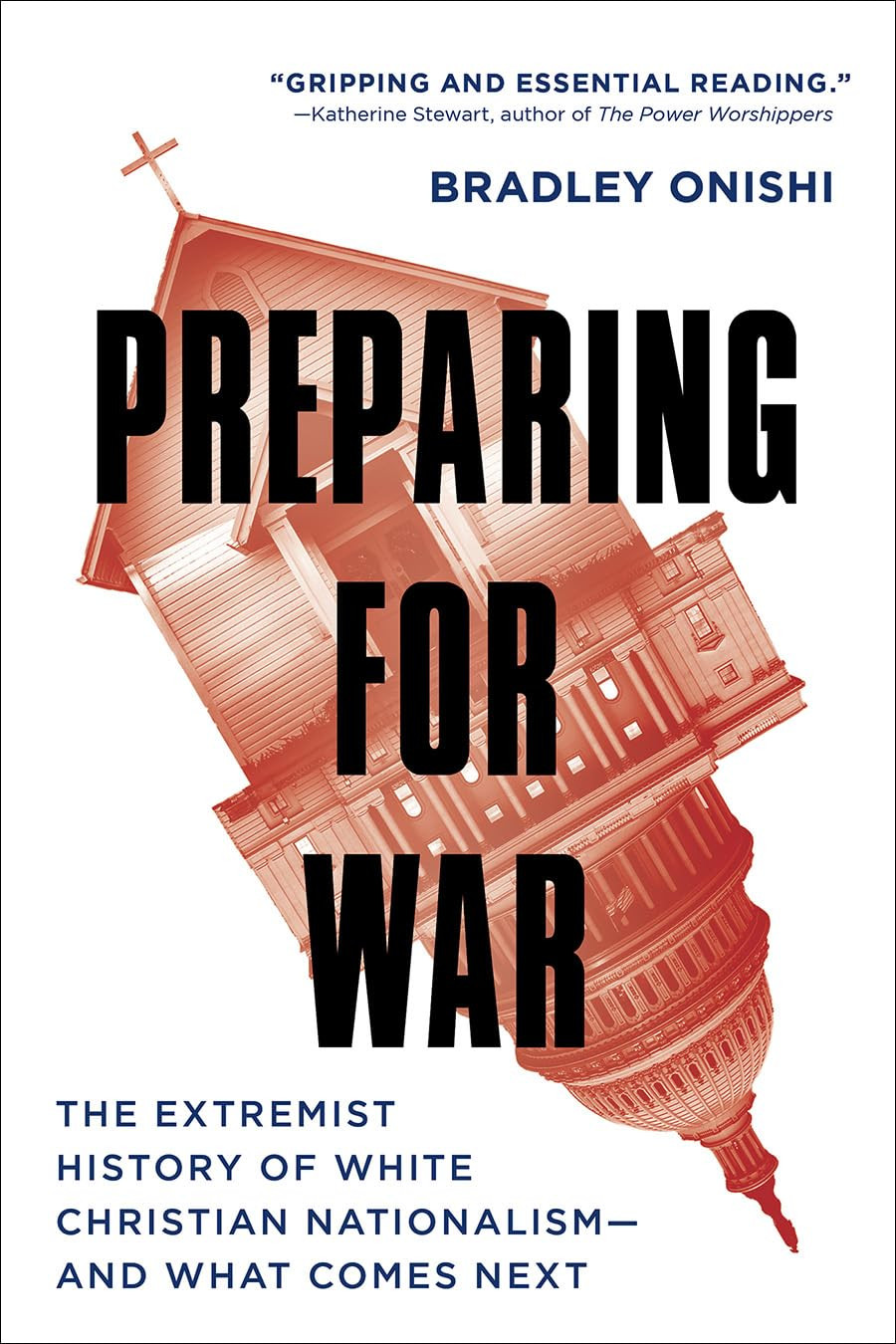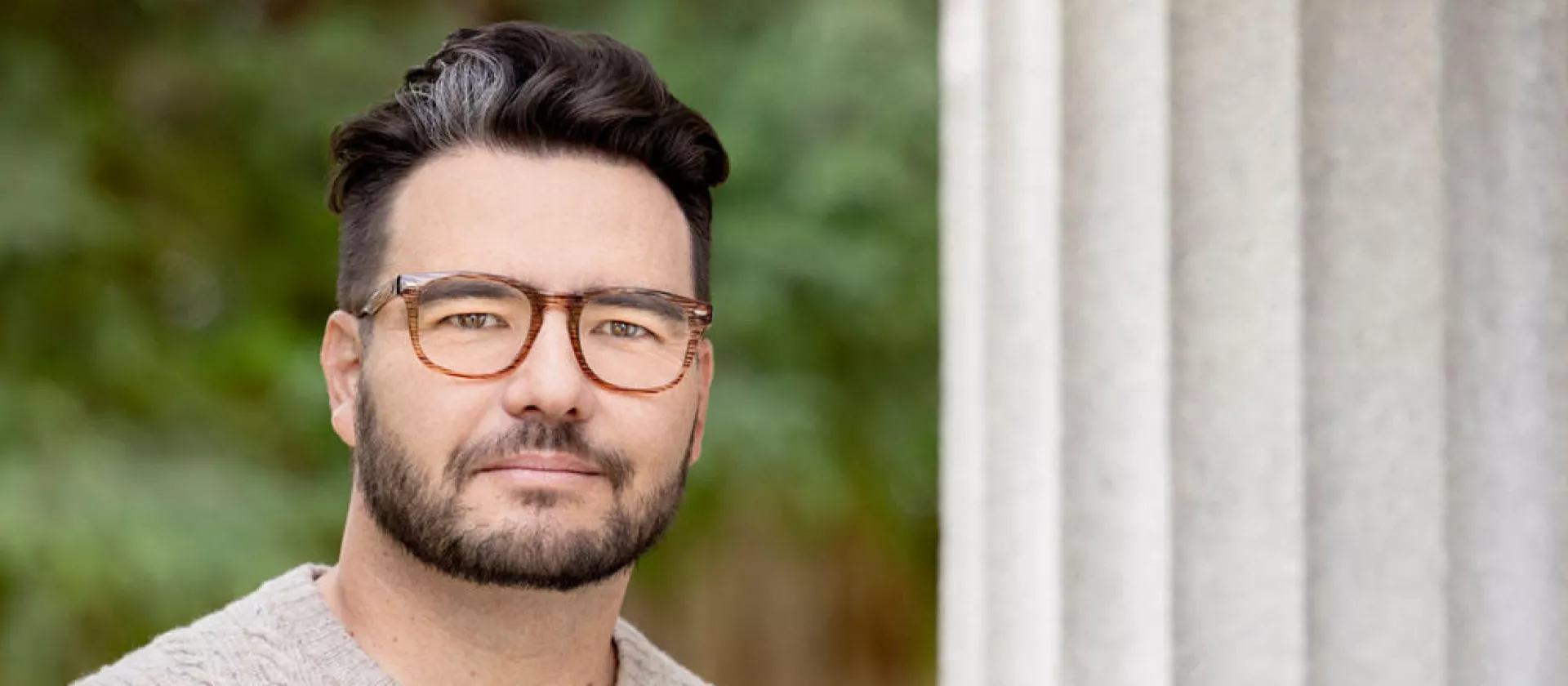Українською читайте тут.
Read about the impact of Christian nationalism on modern America in an exclusive interview with its researcher for Detector Media.
According to his website, after growing up in a non-religious home in Southern California, Brad Onishi converted to evangelicalism at a megachurch in his hometown at age fourteen. His conversion was extreme. Being twenty years old, he was married and in charge of a two-hundred-student youth group. After serving seven years in ministry, he decided to pursue a master’s in theology at Oxford. Soon after arriving in Oxford, he deconstructed his faith and began to study religion historically and philosophically.
Onishi is now the host of the “Straight White American Jesus” podcast, which is among the top 100 most popular political podcasts in the United States on Apple Podcasts, a lecturer at the University of San Francisco, and the author of “Preparing for War: An Extremist History of White Christian Nationalism. What's Next?”. In an exclusive interview for Detector Media, he talked more about how Christian nationalism in the United States explains the current events happening in the country and how it is applicable to Trump's approach to the Russian aggression against Ukraine.
— For people across the Atlantic, the concept of the Christian nationalism and its impact on current US politics, both domestic and foreign policy, seems to be a little bit surreal. So as a specialist in the field, can you please briefly explain the concept to the audience that might not be pretty much aware about it and why it is important to talk and know about it in the context of the ongoing events in the United States?
— Great question. Christian nationalism is principally a cultural identity that Americans take on. It's a way to tell a story about themselves and about our country. The story says that this country was founded as a Christian nation and it is “a city on a hill”, meaning it is chosen by God to play a special role in human history. Christian nationalists believe that those who are in question are the true inheritors of the founding vision for the United States. And as such, they believe that Christianity should have a privileged place in our public square and in our politics and economics and in our culture. Christian nationalists often are nostalgic for a time when they believe the country was great, i.e. a time when more people were Christian, when the country was less diverse religiously and racially and when Christianity was the unquestioned cultural identity marker that one might see in public in terms of its influence on our politics.
The influence [of Christian nationalism on US politics currently] is immense. People who are Christian nationalist have supported Donald Trump for the last three election cycles in large numbers. In fact Christian nationalism is often the best predictor for whether or not somebody supports Trump. And what that means is if you isolate all other variables and just ask somebody...questions that would identify them as a Christian nationalist that is a very good predictor that they have supported Donald Trump. Christian nationalist will say that they believe that the US government should declare the United States a Christian nation. They believe that the public schools should teach the Bible in their curriculum. They believe that the church should have a veto power over the government's policies and so on and so forth.
So one last thing that's important for those across the Atlantic is that Christian nationalism is a form of American exceptionalism. It's a way for people to claim that the United States is different from all other nations, especially Europe. To say that Europe is one thing and it has one history. But the United States was founded with a special purpose in contrast to Europe. And our Christian nature is what sets us apart. That Europe abandoned God a long time ago, but we are the true inheritors of God's plan for this world and that means we have a special relationship with Israel. So there's more to say but Christian nationalism is a driving force in our politics. It is one of the ways Donald Trump has maintained his popularity.
He has populated his cabinet with Christian nationalists including Pete Hegseth, including Matthew Whitaker, including Kristi Noem, including many others. And the speaker of the house, Mike Johnson is an open and extreme Christian nationalist of the highest degree. So if you want to understand American politics, you have to understand Christian nationalism.
— That's a very good explanation that we tried to do with the article we've prepared for the Ukrainian audience about what a phenomenon that is. But in all the materials we've looked through for this purpose we've noticed that the concept of the Christian nationalism in the American context is not that much mentioned in the situation of the Russian aggression against Ukraine...Can we apply that concept to Trump's approach to that issue? If yes, how is it exercised and how is the Christian nationalism in the United States related to Trump's approach to that issue? Yeah, it's a very good question.
— Christian nationalists are Christian exceptionalists but they are also nationalists. And what they will say is that God created the world for different people [and] groups to form communities and to develop their own ways of life. So when God created Adam and Eve and God, created the whole world, he always planned for them to go into the world to different corners and to create their different communities and those communities would eventually become nations. So God's plan for the world is for there to be separate nations with borders, different ways of life, different cultures, different foods, all of those things. So what they will say is, one of the problems with the United States is that we've abandoned our own way of life and our own culture and this is why we have to close the border. This is why we have to deport people. This is why we have to take back the country from those who don't deserve it whether they're immigrants or Muslims or whoever.
When it comes to Russia, many Christian nationalists revere Vladimir Putin because they see him as a leader who protects his own nation. Who is a proponent of Christian values and spiritual heritage, and who firmly isolates his way of life and people from the influence of Europe and the globalists and those who would mix up and meddle in the Russian way of life. And so when Putin attacks Ukraine for Christian nationalism, This is a matter of Putin and his part of the world's business...(and I don't agree with this, don't worry, by any means). If Putin says that Ukraine is part of Russia and he wants to take it back from Europe, the globalist woke Europe, the EU who is willing to allow open borders and refugees, and gay people to be leaders, and all this stuff, then that's none of our business as the United States. And we should actually protect and elevate leaders like Putin who are developing this traditional way of life and protecting his people. Some Christian nationalists even say that they would rather have Putin lead the country than Joe Biden or Kamala Harris because at least he protects their people. So, Christian nationalists really view Putin's aggression toward Ukraine as trying to protect Russia from the influence of the demonic and satanic forces in the EU and that is why when Trump is friendly to Putin, the Christian nationalists support him.
— When we also look at the rhetoric regarding that particular notion, we also notice some, as we call it, de-escalation rhetoric, meaning that the US foreign policy approach at the moment focuses on ceasefire first and stopping the violence, that whole thing. So when we talk about this anti-violence dimension of such rhetoric, is it in your opinion also related to Christian nationalism tendencies? Can we also apply that thing to that particular dimension of the US rhetoric regarding that?
— Well, I think the de-escalation rhetoric from our leaders is a function of our president not wanting to say anything negative about the Russian president and to contradict him or to somehow confront him publicly. Calling for Russia to stop their aggression would be damning for our president for a lot of reasons. So one of the ways that Christian nationalist can justify their rhetoric is to say "Look, all we're asking for is a stop to the fighting. We just want peace. We just want people to stop dying. Is that too much to ask?" And then instead of calling in Putin and saying "Why don't you just stop the fighting and the invasion? Why don't you stop the attempt to overtake Ukraine?", they'll call in Zelensky in the Oval Office and say "Why don't you stop right now? Have you said thank you? What's your problem?"
So I think that this is a secondary function of our president's desire to be on the side of Putin and of a kind of subversive rhetoric that calls for peace on the surface but is really trying to protect the interest of Russian aggression.
— You've touched a little bit on that in your other responses, but I would like to focus more on how else is the Christian nationalism at that moment reflected in the US foreign policy except of Ukraine, except of Israel as you mentioned and possibly regarding the deportations/immigration issue. What are other signals where you see Christian nationalism being used for the foreign policy specifically?
— I think the best way to understand Christian nationalism and foreign policy in the United States is to understand a desire to replicate what Victor Orban is doing in Hungary. What Victor Orban says in Hungary is that he wants to resist the communism of previous decades, of course. But by resisting communism to not choose the liberalism and capitalism that has been the dominant model since 1989. And so by doing that Orban chooses a Hungarian nationalism. He refuses to accept refugees. He does not want non-Hungarians in the country. He wants to, quote and quote, "protect the Hungarian way of life and keep it unmixed and without blemish, without infection". That's how Christian nationalists view the United States.

The cover of Brad Onishi's book "Preparing for War: The Extremist History of White Christian Nationalism - and What Comes Next"
They want to create a situation where the United States is free from the presence of those who they deem not real Americans. And in terms of foreign policy, this is why we see isolationism and this is why we see protectionism. It's because Christian nationalists see in Trump somebody who will say to the world "We are not interested in welcoming you to our country and we are not interested in protecting you or being the dominant world power that will help those resist totalitarianism or authoritarianism or aggression" such as in the case of Putin. "We are not going to protect you and we're not going to welcome you. We are simply going to develop our own way of life that is separate from you and you should do the same and not get in our way. And if you get in our way then we will be aggressive or we will put tariffs on you". Otherwise we just want to isolate and create our own way of life. So this is why our foreign policy of isolationism is the flip side of the desire for mass deportations. And it's of course very foolish and very short-sighted. It does not see a lot of things clearly including the way that the global markets and economies are entangled, the way that this endangers so many people and so on and so forth. But you can clearly see Christian nationalism in the isolationist foreign policy of the Trump government.
— And my last main question is what has been implemented of the Christian nationalist agenda during Trump's second term so far? And what do you expect to be implemented in the near future? We also did an explainer on Project 2025 and explained how this has become a tool, including for Christian nationalists in the Trump administration, to implement those ideas and policies basically at that moment. So can you please from your expert point of view talk about what has been implemented so far and what do you expect to be implemented in the nearest future?
— So I think the best way to understand Project 2025 is as the policy vision of American Christian nationalism. Project 2025 outlines a sweeping vision but also the ways that the government should impose its understanding of family and sex and gender, of trade, of everything one can imagine, on the American people. And so the best way to understand what's been implemented in terms of a Christian nationalist agenda already is to track what aspects of Project 2025 have been adopted. And that includes tariffs, but that also includes the fact that the United States government has said there are only two genders there right there's male and female and it's impossible to identify any other way on your passport on your government ID...That is the best way to understand Christian nationalism in Trump's policies and I expect all of that to continue going forward.
The main figure (there's a couple but the main figure) who has a grand vision for Christian nationalist agenda is Russell Vought in the OMB and he is the one who is really the mastermind of the implementation of Project 2025. He is of course not only one Christian nationalist. [There is] a set of Christian nationalists in the Trump administration. Another one is JD Vance who is a very conservative Catholic [and] who is close to Kevin Roberts, who is the leader of the Heritage Foundation which published Project 2025. JD Vance wrote the forward to Kevin Roberts new book and is close to him collegially and personally. So the easiest way to track all of this is to track what aspects of Project 2025 have been put in place by the Trump administration.
And the last comment I'll make here is that in its essence Project 2025 is a vision for an executive branch that is unchecked by the other branches of government. The desire is for a president, who is in essence able to do whatever he wants regardless of what Congress or the courts say. And the idea there is that if one can get rid of the power of the administrative state, of the federal agencies, of the federal workforce. If one can clear them out then one can do whatever one wants, unimpeded by the processes and checks of democracy. It's not too far to say that Project 2025 is a soft coup for the executive to be unchecked in any kind of democratic manner in the United States government. And the goal is thus to make sure that one man, the president, can change the country in unprecedented ways without being stopped by policy or law or court decision or any other obstacle in his way. This is the way that the Christian Nationalists believe the country will be great again, that the deep state, and the bureaucrats, and the liberals in our institutions won't be able to get in the way of the man they elected and so Project 2025 is about an unbound executive.



